Text
Should I Replace Front And Rear Brakes At The Same Time?
Actually, in most cases, it is not necessary to replace the disc brake pads on both the front and rear wheels together. The wear and lifespan of the front and rear brake pads are usually different. Under normal circumstances, the front brake pads experience greater braking force, resulting in higher wear and shorter lifespan. They typically need to be replaced around 30,000 to 50,000 kilometers. On the other hand, the rear brake pads endure relatively less braking force, meaning they last longer. Generally, they need to be replaced around 60,000 to 100,000 kilometers. When replacing brake pads, it is important to replace them together so that the braking force on both sides is balanced.
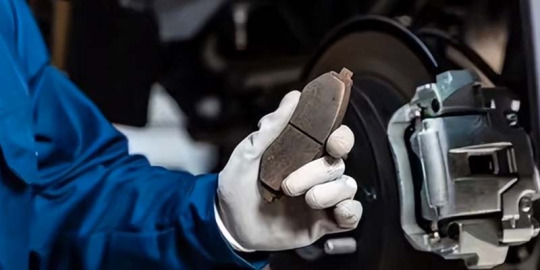
If both the automotive front and rear brake pads have a certain degree of wear, it is also possible to replace all four of them together.
When should brake pads be replaced, and how can you perform a self-check on them? Here are the methods:
1. Check the thickness: A new brake pad typically has a thickness of around 1.5 cm. As they wear over time, the thickness of the brake pad gradually decreases. Professionals recommend that when visually observing that the brake pad thickness is only about 1/3 (approximately 0.5 cm) of its original thickness, it is advisable to increase the frequency of self-checks and be prepared for replacement. Each brake pad has a raised indicator on both sides, with a thickness of around 2-3 mm. This indicator represents the minimum thickness for brake disc replacement. If the brake pad thickness is level with this indicator, it must be replaced.
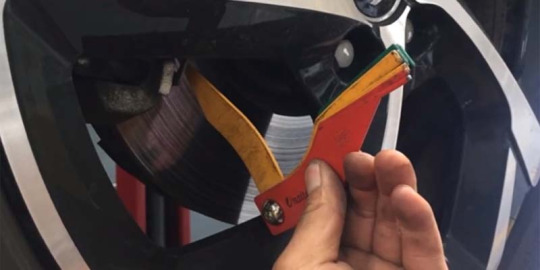
suggestions:It is indeed important to consider individual driving habits and environmental factors when determining the replacement interval for brake pads. While a general guideline is around 60,000 kilometers, it is advisable to have them inspected by a professional technician during regular vehicle maintenance when visually observing that the brake pads are thinning. This is because visual inspection can sometimes lead to errors, and a thorough examination by a qualified mechanic is more accurate and precise.
2. Listen for noises: If you hear a “squealing” sound when lightly applying the brakes, it could be an indication of the initial interaction between the brake pads and the brake rotor upon installation. In such cases, it is recommended to replace the brake pads immediately because they have already reached the limit where the indicator on both sides of the brake pad is directly rubbing against the brake rotor. When encountering this situation, it is important to inspect the brake rotor while replacing the brake pads. The occurrence of this sound often suggests that the brake rotor has been damaged. Even after replacing the brake pads, the noise may persist. In severe cases, it may be necessary to replace the brake rotor. Additionally, the quality of the brake pads can also contribute to the occurrence of such noises.

Therefore, once unusual noises occur during braking, if it is not caused by the brake pads, it is possible that excessive wear of the brake pads has led to direct contact between the brake pad indicator and the brake rotor, resulting in damage to the brake rotor. The cost of replacing a brake rotor is higher than that of brake pads. Therefore, it is advisable for vehicle owners to develop a habit of regularly observing and promptly replacing brake pads when necessary. This will help prevent potential damage to the brake rotors and ensure optimal braking performance.

Therefore, once unusual noises occur during braking, if it is not caused by the brake pads, it is possible that excessive wear of the brake pads has led to direct contact between the brake pad indicator and the brake rotor, resulting in damage to the brake rotor. The cost of replacing a brake rotor is higher than that of brake pads. Therefore, it is advisable for vehicle owners to develop a habit of regularly observing and promptly replacing brake pads when necessary. This will help prevent potential damage to the brake rotors and ensure optimal braking performance.

If you feel a lack of braking power when applying the brakes, it is possible that the brake pads have significantly lost their friction. In such cases, it is crucial to replace the brake pads to avoid potential serious braking accidents.
Therefore, it is important to develop a good habit of self-checking. Additionally, decreased braking performance can lead to increased consumption of brake fluid. Therefore, when replacing brake pads, it is necessary to check the condition of the brake fluid as well.
Explore more useful information: https://ketullabrakes.com/why-us/
#brakes#ceramicbrakepads#ketullabrakes#semimetallicbrakes#brake pads#rearbrakepads#frontbrakepads#toyotabrakepads
0 notes
Text
youtube
How to replace toyota camry rear brake pads?
#brakes#ketullabrakes#ceramicbrakepads#semimetallicbrakes#toyotabrakepads#brake parts#toyotabrakepadsreplacement#toyotacamrybrakepads#brakepadsfortoyotacamry#Youtube
0 notes
Video
youtube
How To Replace Your Toyota corolla front Brake Pad
#youtube#toyotabrake#toyotabrakepads#toyotabrakepadsreplacement#corollabrakepads#toyotacorollafrontbrakepads#toyotafrontbrakepadsreplaement
1 note
·
View note
Text
What Cause The Squeaky Of Brake
Just check the factors those cause the squesky of brake, also hope you can leave us other factors, let us work together to unstand all situation.
Brake Pad Wear

2. Brake Dust And Debris
Accumulation of brake dust, dirt, and debris between the brake pads and rotors can result in squeaking. These particles can create friction and vibrations, leading to the noise.
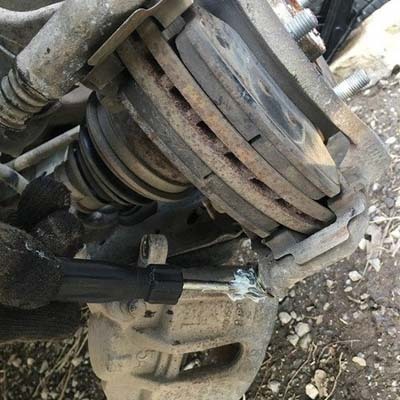
3. Glazing Or Hardening Of Brake Pads
Over time, brake pads can develop a glazed or hardened surface due to high heat or improper bedding. This glazed surface can cause noisy and less effective braking.

4. Brake Rotor Issues
Uneven rotor wear, rotor warping, or the presence of grooves or scoring on the rotor surface can contribute to brake squeaking. These conditions can interfere with smooth pad-to-rotor contact and cause vibrations and noise.
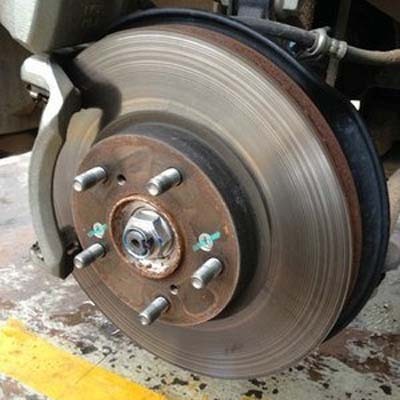
5. Disc Brake Caliper Issues
Sticking or seized brake calipers can lead to uneven brake pad contact and cause squeaking. Additionally, worn or damaged caliper hardware, such as guide pins or clips, can result in noise.
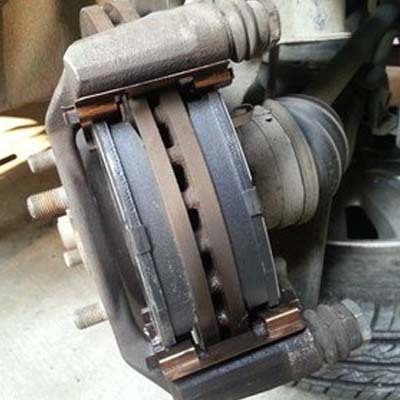
6. Moisture Or Contaminants
Moisture, water, or certain contaminants on the brake pads or rotors can cause temporary squeaking until they are worn off or dried out.

7. Improper Brake Pad Installation
Incorrect installation of brake pads, such as not applying proper lubrication or failing to secure them correctly, can lead to noise issues.

Click here to check more details.
#brakes#ketullabrakes#brake pads#ceramicbrakepads#semimetallicbrakes#brakepadsreplacement#brake parts
1 note
·
View note
Text
Toyota Front Brake Pads
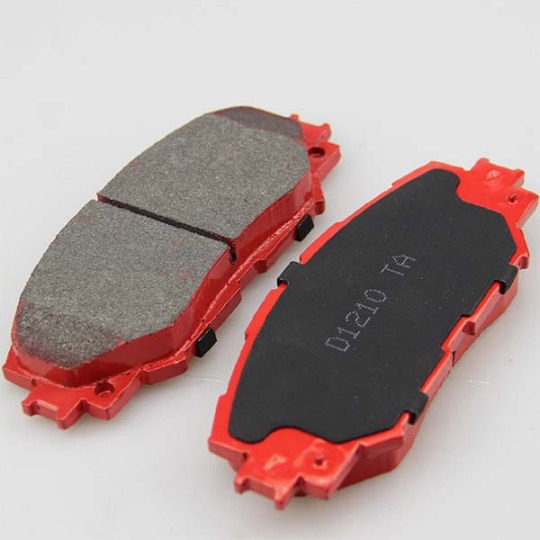
At Ketullabrakes, we offer 382 different types of front brake pad products for your Toyota at competitive prices to suit your budget. Save costs when you find your Toyota replace the front brake pads with us. You can check our webpage for front toyota brake pads, meanwhile, you can subscribe us to get updated information for Toyota brake pads.
We not only have to compare prices, but we also have to look at the quality of the product to find the best fit for your Toyota car's front brake pad products. A good supplier and consistent quality can help you make the right decision.
Whether you are a dealer or the end user, our ketullabrakes is your best choice, because we have 23 years of regular experience in brake pads, from the world's 8732 brands have a very good cooperation with us, I hope you are our next partner, we will definitely give you a different cooperation experience and service.
Search our full catalog of aftermarket Toyota Front Brake Pads products. You can check all we had offered to Make sure to check each Front Brake Pads product to learn which worked the best for our customers.
#ketullabrakes #toyotabrakepads #toyotafrontbrakepads #toyotabrakepadsreplacements #aftermarketbrakepads
2 notes
·
View notes
Text
Best Toyota Brake Pads of 2023: The 8 Best to Buy
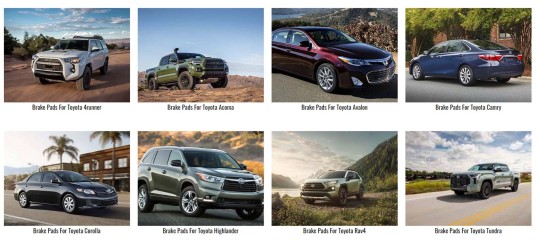
For safe and comfortable driving, the first and most important thing is braking. The performance of the car brake system in emergency situations is very important to our travel safety. Then the choice of suitable and good quality brake pads is something we should seriously consider and treat.
Brake pads are consumables, the frequency of replacement is high, and the quality is directly related to our driving safety. Choosing the right car parts can be difficult, and you should remember that the safety of passengers and drivers depends on your choice.
And our brake pads produced by ketullabrakes are fully in line with your requirements, after all, we have 23 years of production experience, if you are a dealer, you do not have to worry all day to consider whether the quality of the brake pads you sold.
#ketullabrakes#keutllabrakes#brakes#toyotabrakepads#toyotacorollabrakepads#toyotacamrybrakepads#toyotabrakepadsreplacement#toyotabrakepadsforsale
1 note
·
View note
Text
Why Does My Car Shake When I Brake?
Brake shaking can be a common symptom that car owners tend to overlook. There are two main situations that can cause brake shaking;
ABS brake: When you apply firm pressure on the brake pedal and feel a “pulsating” sensation, it is likely that the ABS (Anti-lock Braking System) is actively working to provide controlled braking. This is a normal occurrence, especially on slippery surfaces such as snow, mud, or wet roads.

Brake disc wear: This situation is often seen in older vehicles with worn or unevenly worn brake discs. The surface of the brake discs may become uneven, affecting their smoothness. When this happens, it is important to promptly check the runout of the brake discs. If the runout exceeds the standard requirement, the brake discs should be replaced immediately to avoid potential accidents. Brake pulling, where the car veers to one side when braking, is another common issue associated with brake disc wear. This indicates an imbalance in braking force, potentially caused by uneven brake pad wear or a problem with the brake caliper. If you experience brake pulling, it is recommended to have your vehicle inspected at a repair shop.
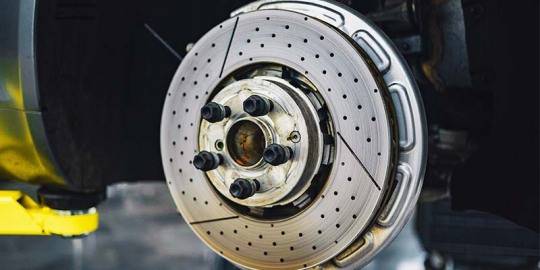
Soft brake pedal: Insufficient brake fluid, contaminated or moisture-contaminated brake fluid, or issues with the brake master cylinder, brake lines, or connections can lead to a soft brake pedal. When this occurs, it is crucial to diagnose and resolve the underlying issue promptly. Following the vehicle’s maintenance instructions and regularly replacing high-quality brake fluid can help ensure driving safety.
Heavy brake pedal: Many brake systems rely on vacuum assist to reduce pedal effort. If the vacuum assist system is malfunctioning, you may experience a heavy brake pedal. In such cases, it is advisable to first check the vacuum assist unit for any faults.

Severe brake pad wear: Uneven pad wear can cause one side of the brake pads to wear more than the other, resulting in a skewed wear pattern. There are several potential causes for this situation: improper positioning of the guide pin and piston in the brake caliper, frequent brake application during turns due to driving habits, and brake pad material issues. To address these problems, the guide pin should be removed, lubricated, and reinstalled. If the piston is stuck, it needs to be removed, resurfaced, and lubricated to restore proper functionality. Additionally, if the brake pad material is causing the issue, it is recommended to promptly replace the pads with ones that meet the necessary standards.
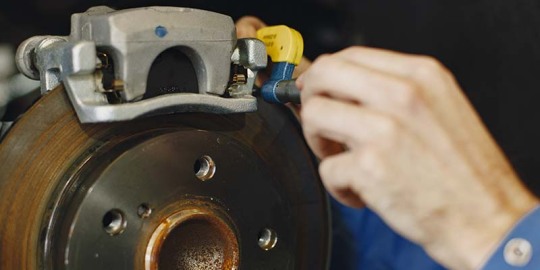
#ketullabrakes#brake pads#brake pads replacement#ceramicbrakepads#semimetallicbrakes#brakes#auto parts
1 note
·
View note
Text
1 note
·
View note
Text
1 note
·
View note
Text
Why do my brakes still squeaky even after I have new brake pads and discs?
If there is a squealing noise during braking, it is generally not a problem, and the braking performance is not affected. The noise is mainly caused by friction between the brake pads and the brake discs, which is related to the materials used in the brake pads.
In some brake pads, there may be larger particles of metal wire or other hard materials. When the brake pads wear down to these substances, they can create noise when in contact with the brake discs. Once they are worn past these particles, the noise will disappear, so it is considered normal. It does not affect safety, but the noise can be annoying. If you cannot tolerate such braking noise, you can consider replacing the brake pads with higher-quality ones to solve this problem.
Possible causes of abnormal noise in brake pads include: excessively hard brake pads, brake pads worn down to their solid frames, excessive wear on the brake discs or brake hubs, rust on the brake caliper piston, ineffective handbrake cables, slow return of the brake master cylinder piston, etc.
If it is a new set of brake pads, it is necessary to check if any foreign objects have been trapped between the brake disc and the pads. If there is a muffled noise, it is often related to issues with the brake caliper, such as worn-out guide pins or detached retaining springs. If there is a continuous squealing noise, there may be multiple problems with the caliper, brake disc, or brake pads.
If the noise persists, first check for dragging brakes. Poor caliper retraction can cause prolonged friction between the disc and the pads, resulting in abnormal noise under certain conditions. Also, check if any foreign objects are wedged between the pads and discs. If it is a new set of pads, examine the brake disc for grooves because localized friction can lead to noise. If there are no issues with the disc, consider whether the brake pads are too hard or if there was an incorrect installation of noise reduction shims.
It is important to note that any abnormal noise during braking should be inspected and diagnosed by a professional to ensure the safety and proper functioning of the braking system.
How to fix the Squeaky of brake pads, just click here to find more details:
2 notes
·
View notes